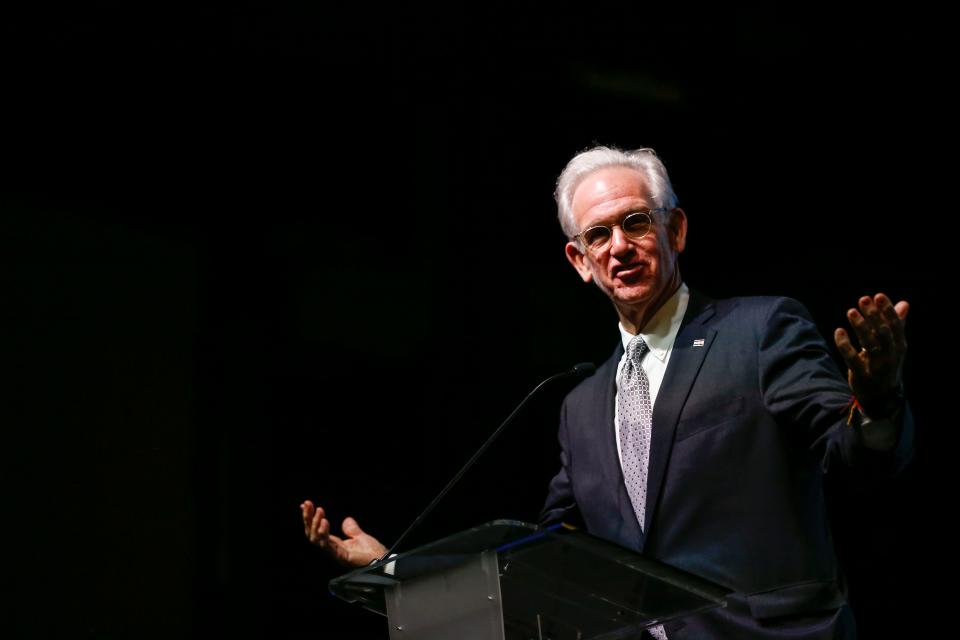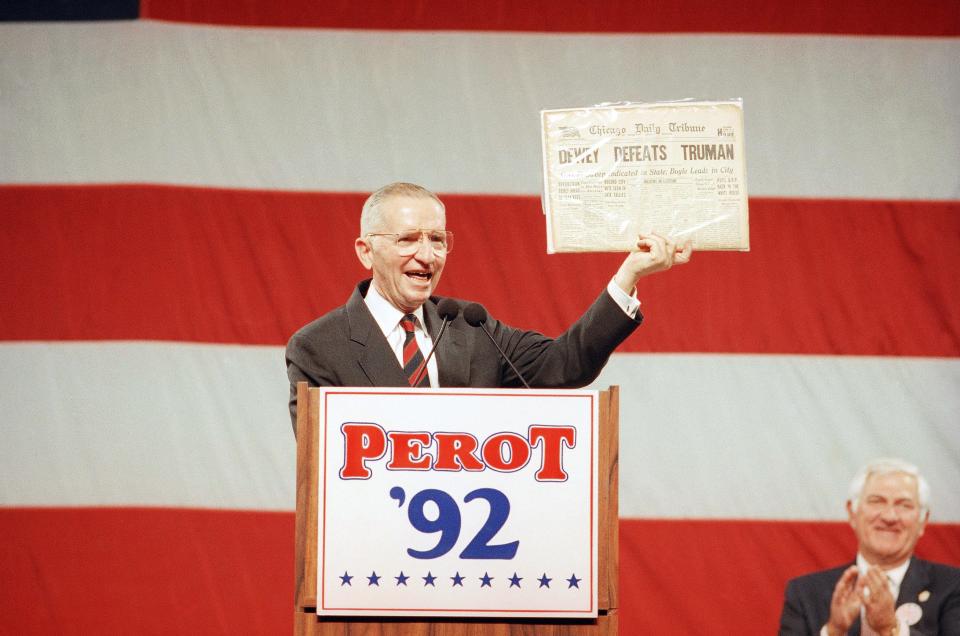No Labels push for independent 2024 presidential ticket yields mixed reactions, concerns
- Oops!Something went wrong.Please try again later.
- Oops!Something went wrong.Please try again later.
- Oops!Something went wrong.Please try again later.
- Oops!Something went wrong.Please try again later.
Former Missouri Gov. Jay Nixon has rejoined the political fray, although not as a candidate for political office.
He has accepted an unpaid role as director of ballot integrity for the No Labels group, an organization exploring an independent unity ticket for the 2024 presidential election.
Founded in 2009 by former U.S. Sen. Joe Lieberman, No Labels advocates for bipartisan solutions, believing that the partisan division in the country has left many feeling “politically homeless.”
It is co-chaired by former North Carolina Gov. Pat McCrory, former Maryland Gov. Larry Hogan and Benjamin Chavis, president and CEO of the National Newspaper Publishers Association.

With some critics bemoaning the possibility of a repeat of the 2020 presidential election in 2024, No Labels hopes to offer an alternative — but only if voters indicate their desire for a third-party candidate from the organization.
In what it has called an “insurance plan,” No Labels is pushing for ballot access in all 50 states so that it could nominate a candidate “if the two major parties select candidates the vast majority of Americans don’t want to vote for in 2024.”
Requirements vary by state, but in Missouri that would mean that No Labels would need about 10,000 signatures from registered voters before July 29, 2024 to make the ballot that November.
According to the organization, it has already gathered 700,000 signatures and obtained ballot status in five states — Arizona, Colorado, Utah, Oregon and Alaska.
The plan is not without opposition. Democrats in Arizona have sued to keep No Labels off the ballot and former U.S. House Majority Leader Richard Gephardt launched the Super PAC Citizens to Save Our Republic to counter the third-party movement.
In a letter to the St. Louis Post-Dispatch on Aug. 3, Nixon, a Democrat who served as governor from 2009-2017, condemned the opposition. Although he acknowledged fears that a third-party ticket may split the vote, he offered assurance that the party would honor its agreements.
“I am confident that No Labels will not play spoiler in the 2024 election.” Nixon wrote. “It has pledged to stand down if extensive polling reveals an independent Unity ticket has no chance to win.”
Nixon points to recent attempts to raise barriers to ballot access as his reason for joining the No Labels movement.
“In several landmark cases, the Supreme Court has ruled that organizing voters for ballot access is protected speech under the First Amendment,” Nixon wrote. “But that hasn’t stopped an increasingly organized group of operatives and partisans from trying to keep No Labels off the ballot.”
Some political experts in Missouri were surprised by Nixon’s decision to join the organization.
“Trying to get back into the fray of national and statewide politics seems an interesting choice,” said Thomas Ringenberg, professor of political science at Rockhurst University. “I think it's just one of those things where watching from the sidelines, you say, ‘Wow, we were able to do it better. I won state office. There's got to be a way here.’”
Trump v. Biden 2.0 — the rematch many hope not to see
As the 2024 election draws nearer, the likelihood of a rematch between President Joe Biden and former President Donald Trump only seems to grow.
New York Times/Siena polling from July shows that neither the Democratic nor Republican parties have produced candidates with greater traction among voters than Biden and Trump. The two remained deadlocked, each with 43% of respondents indicating their preference for the candidates.
While both appear to have majority support within their own party, polls have shown many voters think neither man should seek a second term.
In April, an Associated Press-NORC Center for Public Affairs Research poll showed only 30% of Americans thought Trump should run again, while only 26% felt the same about Biden. The poll had a margin of error of plus or minus 3.9%.
Such results seem encouraging for third-party candidates considering a run on a more moderate platform.
A USA TODAY/Suffolk Poll from April found that 9% of Biden voters and 6% of Trump voters would support an independent candidate if the two face off again. However, 50% of Biden voters and 42% of Trump voters said they would back their respective candidates.
About a third of voters polled who already identify as independent planned to support a third-party candidate no matter what. That poll had a margin of error of plus or minus 4%.
Experts believe that voters are sometimes less enthusiastic about support their party's candidate than they are to ensure that the opposing candidate does not win.
“It’s not so much because of people's love for their own party but hatred generally of the other party,” Ringenberg said. “It's called effective polarization.”
More: What Josh Hawley, Eric Schmitt, other Missouri lawmakers said about State of the Union
Many Democrats worry that a third-party candidate will be unable to win, but will split the vote for Biden, giving Trump a clear path to victory.
“It's a problem for the Democrats,” said Peverill Squire, a professor of political science at the University of Missouri. “Probably not so much in Missouri, but potentially in some other places.”
However, leaders of No Labels have indicated that the group would exit the race if it appeared the inclusion of its candidate ticket would give Trump an advantage. It plans to pursue “if and only if, such a ticket has a viable path to victory.”
Third-party candidates have seen little success in recent history
While a third-party candidate sounds attractive to many frustrated with the current partisan divide, it is rare for one to win the presidency.
In fact, the last third-party candidate to reach the White House was Abraham Lincoln in 1860, when the Republicans were not yet considered a major political party.
Although they rarely win, third-party candidates often cause upsets for candidates who may have won otherwise.
“A third party almost never wins and is not likely to win in 2024,” said Daniel Ponder, a political science professor at Drury University. “But third parties can certainly be determinative.”
The last third-party candidate to win electoral votes was former Alabama Gov. George Wallace, who ran as an independent in 1968 against Hubert Humphrey and Richard Nixon, who won by a narrow margin.
“There's at least an argument to be made that Hubert Humphrey was denied the presidency because of a third party,” Ponder said.
Although he received no electoral votes, independent candidate and businessman Ross Perot pulled 19% of the popular vote in the 1992 presidential election. Although incumbent George H. W. Bush lost reelection to Bill Clinton, analysts speculate that Perot pulled votes equally from the two candidates.

In more recent presidential elections, third-party candidates have garnered single-digit support from voters. In 2020, Libertarian Jo Jorgensen won just over 1% of the popular vote.
Who would run as a candidate on this third-party ticket?
If the No Labels movement were to offer an alternative candidate, the true question lies in who they would choose to represent them. The group has not yet offered any insight into the matter.
“If you ask people, ‘Would you prefer somebody other than Joe Biden or Donald Trump?’ Everyone says, ‘Yes.’” Ringenberg said. “But if you tried to say what sort of person that would look like, it's really hard to imagine very many people who fit that.”
Given the partisan divide that inspired the No Labels movement, it may be difficult to find someone who is generally palatable to voters across the board. Anyone who has already been associated with a political party or movement could face instant opposition, so the key may lie in finding someone outside of politics.
“I think it would be tough to talk people into that,” Ringenberg said. “Even if you're a celebrity or a business person or somebody who truly is in that middle ground, getting into politics right now is not pleasant.”
More: At retreat, SPS board members agree to curb smartphone use in meetings, stop interrupting
However, before No Labels can think about selecting a candidate, it will need to secure ballot access. It has less than a year until the deadline to make the 2024 ballot in 45 states and the District of Columbia.
“If you don't have a good organization on the ground in each state early, then you're not just focusing on campaigning, but you're really scrambling to try to make the ballot in the first place,” Ponder said.
Some experts feel that to be truly competitive, No Labels should be playing a long game by building support at the state level before setting its sights on the presidency.
“Unless you can prove your case in these polarized county elections and everything else, I think you should probably stay off the Senate and presidential tickets because you're just going to create chaos and a really expensive race,” Ringenberg said.
This article originally appeared on Springfield News-Leader: Experts weigh in about impact of No Labels effort on 2024 election

